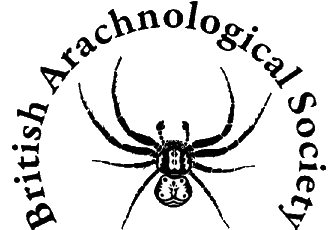Trustees and key post holders
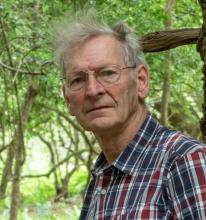
|
Jeremy Poole Membership Officer | Despite being an engineer and physicist during his working life, Jeremy has always had an interest in the outdoors and the natural world. His interest in spiders grew from a frustration at not being able to identify even the commonest spiders in his garden. He has addressed this issue by attending a spider identification course and a number of BAS Field Weekends, where he has greatly valued the friendship and advice of more knowledgeable members. Jeremy recently volunteered to be the BAS Area Organiser for Dorset, and joined Council as Membership Officer in 2023. He is a keen photographer and microscopist and is unusual in having a Scanning Electron Microscope in a laboratory in his garden! He uses this to create images of a wide variety of subjects, including, of course, spiders. His other interests include playing the cello, both as a member of a string quartet and with a pianist friend. |
| |
Jim Pewtress Hon. Treasurer | Jim spent many years working as a warden for the Youth Hostels Association in northern England before running a village shop and Post Office for five years. Over the last 20 years he has worked for two different national charities, firstly as a fund-raiser and latterly as a witness service manager in the York Courts. His interest in natural history started with birds. He was a bird ringer for 30 years, secretary for the Yorkshire Naturalists' Union Bird section for 10 years, and has been involved in bird survey and recording at local and national levels. Jim's interest in spiders was triggered by attending a course at the former Kindrogan Field Studies Council Centre; he now does most of his spider collecting in and around VC62. He became treasurer of the BAS in 2018 and has served in that role ever since. |
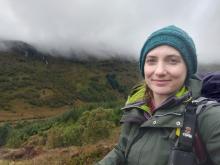
|
Kirsty Godsman Training sub-committee chair | Kirsty is an ecologist with a background in applied ecological research, specialising in forest biodiversity. She first gained an interest in spiders as a masters student studying invertebrate taxonomy and went on to study British spiders further as a PhD student, becoming proficient in their identification. Having sampled mainly in forests, Linyphiidae have become her favourite group. Now, as an ecological consultant, she is involved in more general invertebrate surveys and research projects which has allowed her to branch out in arachnology more. Her other interests include botany and habitats. |

|
Meg Skinner Media Officer and Harvestman Recording Scheme Organiser | Meg grew up in the rural Cotswolds and has always had an interest in natural history. She studied Biodiversity Conservation at Nottingham Trent University, where she began recording invertebrates as a hobby. Meg has contributed to several wildlife conservation projects and currently works as an ecologist. She has a special interest in harvestmen and has been organising the BAS harvestmen recording scheme since 2019. She was elected to BAS Council in 2021. |
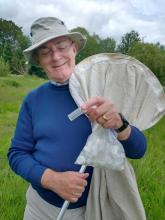
|
Paul Selden Arachnology editor | A retired academic from the Universities of Manchester and Kansas, Paul researched the palaeontology of arachnids and other chelicerates for over 50 years. Paul joined the Council in 1983 as Distribution Manager (to 1986). He served as Vice President 1994–1997 and 2000–2001, and as President 1997–2000. He has been editor of the Society's academic journal Arachnology since 2011, and is an honorary member of the Society. |
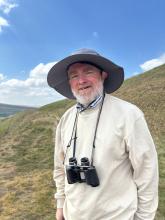
|
Philip Baldwin Ordinary Member | Lifelong interests in zoology, ecology and conservation, specialising in invertebrates |
| |
Richard Gallon Spider Recording Scheme National Organiser | Richard works as a species specialist at a Local Environmental Records Centre in Wales. He is an active contributor to the Spider Recording Scheme, with a particular interest in montane and wetland spiders, and also undertakes taxonomic research on African theraphosids. He became a Council member in 2002, Editor of the BAS Newsletter in 2004 and National Organiser for the Spider Recording Scheme in 2021. |
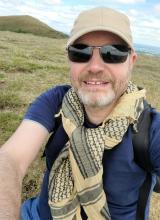
|
Simon Brown Ordinary Member | Simon has always had an interest in the natural world, particularly invertebrates. His passion for spiders grew as good quality guidebooks became more available, making identification possible for novices for the first time. His skills in photography and microscopy have developed alongside his growing interest—both vital tools for taking arachnology beyond basic field identification. With a background in Pathology, particularly Biochemistry, he has had a long career as a Biomedical Scientist, managing clinical laboratories within the NHS. In his spare time, he has spent many years recording spiders in his area of north Worcestershire. Over the past year, he became the SRS Area Organiser for Worcestershire and now verifies records for the county on the iRecord app. He combines a passion for spiders with a love of the countryside. A keen walker, he also serves as a parish footpath warden for the local council, helping to maintain local public footpaths. This voluntary role includes visiting paths and organising teamwork days to resolve issues and repair gates and stiles. In his roles as County Verifier and now as an ordinary member on Council, he hopes to continue encouraging awareness and interest in spiders at every opportunity. |
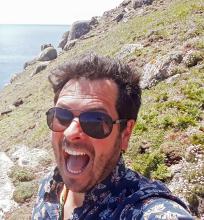
|
Tylan Berry Vice President | After a career of fifteen years in the retail jewellery industry, Tylan has taken a break to focus on a lifelong passion of discovering and identifying British spiders and spends much time volunteering with local conservation groups to help widen the profile of the UK spider fauna. He has recently completed a degree in environmental resource management and currently works for Natural England in the Cornwall and Devon area team. He is the County Recorder and Spider Recording Scheme Area Organiser for Cornwall, and can most often be found looking for spiders on rather beautiful, but precarious, sea cliffs. His mugshot shows the face of a man who has just found a third British site for Gnaphosa occidentalis. |
